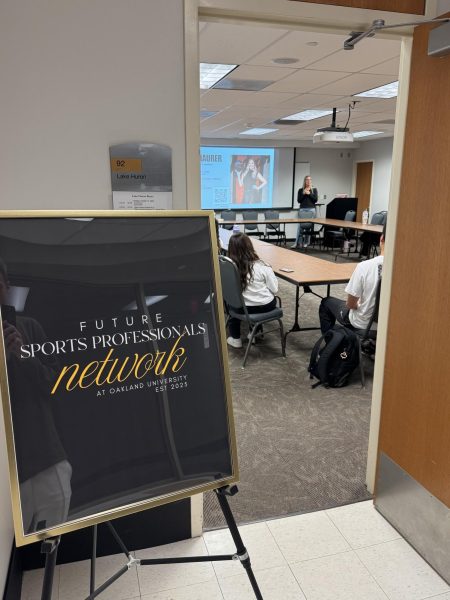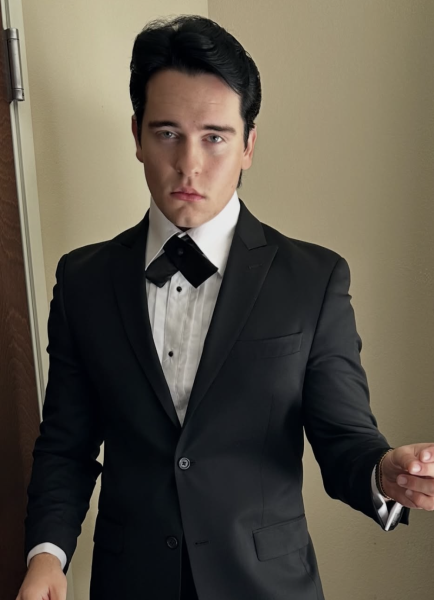‘Just a minor little thing’: Alum declared a medical miracle
The doctors said he had 24 hours to live. That was five years ago.
George Maalouf, who graduated from Oakland University in 1995, was diagnosed with Glioblastoma, an aggressive form of brain cancer, after collapsing in his New York apartment May 8, 2008.
“It was just another lovely day in New York,” Maalouf said. “Cancer has never been a defining moment in my life. I look at it as another minor little problem you deal with.”
The alum was unconscious for several days at the Weill Cornell Medical College and upon waking up May 13, Maalouf was given steroids to reduce swelling and was told he needed immediate brain surgery.
“The scary part about all of it was that I wasn’t scared. I think when you’re scared, you make bad decisions,” Maalouf said. “Too many people fighting a disease are driven by fear. I always tell people to be educated on their diagnosis because knowledge is power.”
After surgery and years of treatment, including chemotherapy and radiation, his doctors have declared Maalouf a miracle. Information and attitude were also a critical part of the healing process, and five years after the diagnosis, Maalouf is in good health.
The diagnosis
Glioblastoma, according to the American Brain Tumor Association, is an aggressive tumor that arises from astrocytes — the star-shaped cells that comprise the supportive tissue of the brain. The tumors are usually highly malignant because they reproduce quickly and are supported by a large network of blood vessels. The cause of Glioblastoma is still unknown.
It represents 17 percent of all brain tumors and is especially difficult to treat because the tumor contains many types of cells. The median survival rate for patients is less than 14 months, and the five-year survival rate is less than 4 percent.
Maalouf was diagnosed the same week as late Senator Ted Kennedy, who passed away in August 2009.
“I needed to know more,” Maalouf said. “When you read the statistics, it shows people only living 3-6 months. I just needed to find that there was at least a one percent chance for survival.”
Maalouf researched his disease and took control of the treatment.
“I never expected to battle something so tough. It is a tough fight, but knowledge is power. After surgery, when I had to start chemotherapy and radiation, I researched my diagnosis and put a plan together.”
Maalouf’s plan included a healthy diet, exercise, stress management, visualization and mediation.
Support at home
Although he graduated with a bachelor’s degree in science, specializing in training and development, Maalouf found a career in fashion, working across the country and internationally in Africa, Germany and Australia.
Once stable after his surgery, Maalouf put his career on hold and moved back to Michigan to be close to family and friends during treatment.
“I lost everything. I was living a life I never imagined, but you just have to let that go. I miss my busy career, but it’s okay,” he said. “Just because your life changes, it doesn’t mean it’s bad. I still wake up blessed with so much. Everything is replaceable except life.”
Maalouf found support from his family and closest friends.
“The sad thing about it is so many people label you as the disease. You’re tested in so many ways. You are alone,” he said. “It’s scary for a lot of people. They start questioning their own lives and mortality. They just don’t want to be around it.”
More than a diagnosis
Throughout his treatment, Maalouf refused to identify himself as a victim.
“I never felt like I had to cope. Just because you’re victimized in life doesn’t mean you have to be a victim,” he said. “I know some cancer patients that let the diagnosis define their life. I’m not going to give something like that control of me.”
Maalouf is always willing to provide support to newly diagnosed cancer patients through support groups, telephone and referrals through the American Brain Tumor Association.
A positive outlook
In addition to his doctors, Dr. John Boockvar at Weill Cornell and Dr. Tom Mikkelsen at the Henry Ford Hermelin Brain Tumor Center, Maalouf considers Jean Ann Miller, the CSA director, his hero.
Maalouf met Miller while working in the Residence Hall Council, where she was an adviser at the time.
While on campus, Maalouf was also involved in SPB, OUSC and the Christian Fellowship.
“He was one of those students who was involved in everything. He had that kind of personality that everyone was drawn to,” Miller said. “There’s certain people you meet that just have that aura about them that’s peaceful. He’s happy with himself and you can’t help but feed off of that energy.”
Miller thinks that same positive energy played a role in Maalouf’s health.
“He’s a great living example that if you have a positive outlook on life, that outlook will dictate your future,” she said. “You don’t have to let challenges be the death of you. He gives hope to people that no matter what the odds are and how horrible things may be, it doesn’t have to defeat you. You can overcome.”
For Maalouf, maintaining that positive outlook has always been about self-assurance.
“I was at the point in my life before all of this happened that I was comfortable in my own skin,” he said. “When you can face yourself, you can face your present. Your greatest wealth is always in front of you.”




